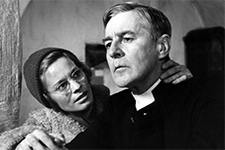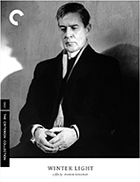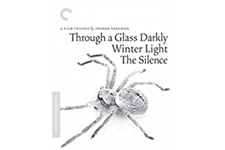Winter Light (Nattvardsgästerna)
|  Ingmar Bergman’s Winter Light (Nattvardsgästerna) is a difficult and dour film, perhaps the most challenging the great Swedish filmmaker ever made. The second of three “chamber films” that made up a loose trilogy in the early 1960s, Winter Light was a sort of “corrective” to the ending of his previous film, Through a Glass Darkly (1961), which dramatized the tensions within a group of family members, one of whom was sliding into schizophrenia. Like Winter Light, Through a Glass Darkly is an emotionally devastating film, although Bergman chose to end it with a relatively weak conclusion in which one character asserts to another that “we can’t know whether love proves God’s existence or whether love is itself God.” The film was, in Bergman’s words, “a desperate attempt to present a simple philosophy: God is love and love is God. A person surrounded by love is surrounded by God,” which is best embodied in the final monologue. Bergman later recanted this philosophy and, to a large extent, the film itself, writing in his autobiography that it is a “falsehood” reflective of his own spiritual struggles. To counter that “falsehood,” Bergman concocted Winter Light, which takes place over an afternoon and dramatizes the collapsing faith of a small-town pastor named Tomas Ericsson (Gunnar Björnstrand). Tomas, who is suffering from a cold and therefore appears frail and sickly, leads a small, dwindling congregation, and the lack of spiritual warmth is reflected in the icy winter outside, whose grim, gray light gives the film its title. Among the small gathering at his noon service are Märta (Ingrid Thulin), Tomas’s former mistress, and a married couple, Jonas and Karin Persson (Max von Sydow and Gunnel Lindblom). Jonas is in the throes of a deep depression, which has been worsened by his learning that China has developed an atomic bomb, and Tomas’s attempts to help him ultimately betray his own faltering faith, which has been slowly chipped away over the years by his witnessing atrocities during the Spanish Civil War and the loss of his wife, the only woman he claims he has ever loved. The narrative covers only three hours of Tomas’s life, but Bergman packs it with revelations, confrontations, and moments of deep spiritual gravity that attest to the fundamental challenge of reconciling the flawed nature of human existence with the divinity and grace of God—a topic that was frequently taken up by the great French filmmaker Robert Bresson, albeit with a significantly different conclusion than Bergman reaches here (whereas Bresson ultimately finds grace in the transcendence of death and the existence of an afterlife, Bergman finds only emptiness). Winter Light is a film of great spiritual and philosophical weight, and it is not to be taken lightly. It is also an aesthetically fascinating film, particularly because it goes against the grain of Bergman’s previous work, which was often rigorously beautiful. Working again with cinematographer Sven Nykvist, Bergman captures the winter light of the title in a way that makes every frame feel cold to the bone; you can feel the chill in the air, which emphasizes the lack of connection among the characters. It is an often rough-looking film, almost documentary-like at times, although Bergman also sprinkles in beautiful, if austere compositions. He also takes a few genuine risks, such as the sequence in which Tomas reads a lengthy letter from Märta that details his various failures in their relationship. Rather than simply using voice-over, Bergman dramatizes the letter by having Ingrid Thulin deliver it directly to the viewer in a single, unbroken take. Thulin’s performance is so intense, so searing, so achingly real that she turns the sequence into the film’s high point, a true evocation of human longing, misery, and masochism. Throughout Winter Light Bergman is evoking some of the deepest and most profound questions facing anyone who is willing to look beyond the material world into the great mystery of what lies beyond, but what he failed to do was inject any sense of human warmth—or even the possibility of it. Almost all of Bergman’s other existential dramas (I haven’t seen all of them, but I have seen most of them) find some room for compassion, decency, and human connection. Winter Light, on the other hand, is almost entirely void of those facets of humanity, leaving us only with desperation, dissolution, despair, and cruelty. As Bergman himself wrote in Images: My Life on Film, “I have always tried to make my films appealing in some way to my audience. But I was not so stupid as to believe that Winter Light would be a public favorite”—a deliberate understatement if ever there were one. As Bergman recognized, Tomas’s dilemma is not just religious: “The pastor is dying emotionally. He exists beyond love, actually beyond all human relations,” which makes him an extremely difficult character to connect with or empathize with. But, it goes beyond that because everyone in the film is dead—literally or figuratively—which gives us little to grasp emotionally, spiritually, or psychologically. Winter Light feels too much like it is wallowing in its despair, rather than grappling with it, which is what Bergman’s best films do.
Copyright © 2019 James Kendrick Thoughts? E-mail James Kendrick All images copyright © The Criterion Collection | |||||||||||||||||||||||||||||||
Overall Rating: 

 (2.5)
(2.5)


 Winter Light is available as part of The Criterion Collection’s “A Film Trilogy by Ingmar Bergman” boxset, which also includes Through a Glass Darkly (1961) and The Silence (1963).
Winter Light is available as part of The Criterion Collection’s “A Film Trilogy by Ingmar Bergman” boxset, which also includes Through a Glass Darkly (1961) and The Silence (1963).